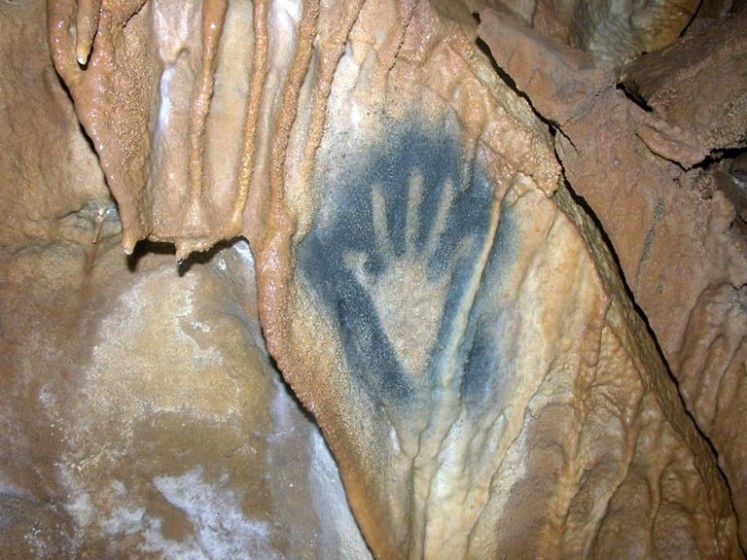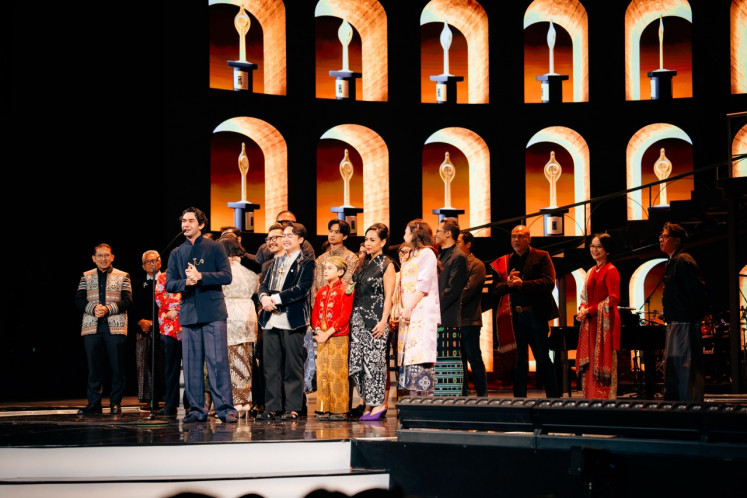Popular Reads
Top Results
Can't find what you're looking for?
View all search resultsPopular Reads
Top Results
Can't find what you're looking for?
View all search resultsAppreciating differences through stand-up comedy
Stand-up comedy can act as a medium for "self-heckle"—an interpretive device whereby comedy acts as a cultural criticism providing sociological insight into the lives of people.
Change text size
Gift Premium Articles
to Anyone
I
laughed guiltily as I was watching a YouTube video of one of my favorite stand-up comedians, Russell Peters, telling a joke about how he was afraid of making fun of Arab people in his comedy routine. The reason why he didn’t do Arab jokes was simply because he didn’t want to... die.
“See, because I’ll do a joke about an Arab, and they’ll look like they’re laughing. But, it’s not the same laugh you’re doing [referred to non-Arab people],” said Peters in 2008.
Everyone, even the Arab people in the audience, burst into laughter.
Only seconds before any first-timer watching the video started thinking, “Man, this is not funny; it’s racist!”, Peters twisted the joke by implying that was exactly how the “media” was trying to stereotype the Middle Eastern world, such as violence and bombs; thus, we shouldn’t fall prey to the false descriptions—and of course, he continued onward poking fun at Arabs.
Peters himself is a Canadian with Anglo-Indian descent famous for his jokes that often revolve around racial, ethnic, class and cultural stereotypes. You can easily find his videos talking about how cheap Indians and Chinese are, or how crazy rich Arabs are (and yet the Indian workers are treated like the new Mexican of the Middle East), or how he is fed up with people talking in Spanish; and still all the Indians, Chinese, Arabs, Mexicans and Latinos in the room cried laughing.
Then I thought, “This guy should come to Indonesia. He’ll find a lot of material for his jokes!”
Stand up comedy as a self-heckling medium (in other words, way to laugh at ourselves)
Daniel Smith states in an article that stand-up comedy may provide a new lens for interpreting social life. Adopting his word, stand-up comedy can act as a medium for “self-heckle”—an interpretive device whereby comedy acts as a cultural criticism providing sociological insight into the lives of people.
Using Russell Kane, another well-known energetic British comedian, as his case study, the observational nature of stand-up comedy somehow shares affinities with the interpretivism in sociological tradition—thus, called “comedic sociology”. The approach that Kane uses through his comedy offers a chance to explore social and biographical narratives and demonstrate comedy’s ability to provide sociological insight into contradictions, absurdities and incongruities of the “social” and also the possibility of different life.
Both Russell Peters and Russell Kane (what are the odds having two Russells here?) practice observational comedic sociology through their jokes—they observe, record, dramatize the reality that consists of contradictions, absurdities, and incongruities, not to mention, stereotypes, despite their different delivery styles.
There is actually a similarity between the so-called observational stand-up comedian and interpretive sociologist: they share an epistimological starting point to their own expertise. King states that a sociologist that interprets life is one that rests upon the comprehension of the ideas and ideals that define it. So, reflecting on the comedy side, to “make fun” is to have understanding of the contents of social life and presenting their limited conceptions, internal contradictions and inadequacy to eventually show the full picture.
That way, stand-up comedy isn’t only a stack of laugh-earning meaningless jokes, but also a medium for people to self-heckle or self-criticize and admit and open their partial mind, especially on the existing knowledge and stereotypes of people, both us (how we see ourselves) and them (how we see others outside our identified group), so that we can together do the bizarre chicken-sound laughter.
Below is the follow-up of Peters’ above joke on Arabs.
Doesn’t it feel like every time you turn on the news nowadays, some new country is fucking with an Arab country? I kind of blame the media for what’s going wrong in the world right now, because they kind of just perpetuate stereotypes about people. They don’t tell you that’s what they’re doing.. what they do is they’ll show you an image of somebody of a different racial background, and they’ll show you an alternate image like right away, of something completely different. The don’t say the two images are together, they kind of present it like, “What do you think?”
They’ll show you an Asian guy and then a car accident. They’ll show you an Indian guy and 7/11. They’ll show an Arab guy and an explosion. What do you think?
Appreciating differences through stand up comedy, case of Indonesia
I’m honestly among the people who are tired of the hatred spread during, and even after, the latest Jakarta gubernatorial election—let alone other regions; the online fuss netizens create over different political or even general views; the everyday biases on genders; and most importantly, the clashes ignited by racial sentiments and stereotypes.
I’m thinking, “I guess we have to chill a bit, don’t we?”. Why do we have to be negative all the time? Why fuss? Why do we have to focus on differences as something absolutely divisive, rather than see them as a uniting force—better a funny one?
Realizing that stand-up comedy can act more than just a people-telling-stupid-stories, it can also perform its specialty in making us realize of how rich and funny our differences are—and by saying us, it includes us and them individually. That way, we can learn about each other, especially the us, as we are commonly blind to ‘the ugly side’ of ourselves while crystal clear about the others/them. As pointed out by Simmel, we never appreciate the absolute individuality of others but rather always have a limited conception of them as a social type, e.g. officer, priest, businesswoman, and even to some extent, ethnicity.
Indonesia is indeed a very huge archipelagic country with a big number of people of hundreds different backgrounds. We are Javanese, Sundanese, Batak people, of Chinese, Arab descent, mixed, Muslims, Christians, men, women, supporters of certain political beliefs, and other labels, you name it. And it’s so sad that quarrels are sparked by our self-claimed absolute understandings of us and them; it won’t end, will it? Bhinneka Tunggal Ika (Unity in Diversity), right?
I know some Indonesian stand up comedians already doing it, such as Pandji Pragiwaksono, Ernest Prakasa, Arie Kriting and Boris Manullang; but, mostly they are only “allowed” to make fun of their own background, and not others’, for example Ernest bringing up Chinese narrative or Arie on his eastern Indonesia heredity. That’s clearly not bad, and perhaps the best way for now, looking at the sensitivity of Indonesian people nowadays.
Of course, I realize that such pure expose to issues, like race, religion, and ethnicity, in Indonesia is still a sensitive space to roam in, due to some historical experiences, primordial belief and superior feeling over another. That’s why the (comedic) sociological approach shall take place to learn, adapt, and adopt the best way to bring up the stereotypes, laugh over it, self-heckle, laugh again over how little our understanding about us and them are, and get enlightened through seeing the big picture of once the only puzzle we know of.
Stand-up comedy certainly can act as a platform for people to observe their surroundings and take-and-give the insights through a comical way, and when people laugh and are happy, they tend to positively respond and open their mind to the new information. Thus, note to stand-up comedians: see and observe things and try to use your ‘stereotypical’ joke as channel to transfer new knowledge to your audience; and note to audiences: be open-minded, less-prejudiced and easy-laughter.
That way, we can all laugh at and with each other, and, instead of depreciating our differences, we can start appreciating them gleefully. (kes)
***
Aufa is a graduate of University of Indonesia, having majored in international relations. Not a comedian himself, he enjoys laughing over witty jokes, and tries to produce them too, for the sake of self-fulfillment. Sometimes, he also likes to play with words through pictures -- check out his Instagram at @aufaahdan for proof.
---------------
Interested in writing for thejakartapost.com? We are looking for information and opinions from experts in a variety of fields or others with appropriate writing skills. The content must be original on the following topics: lifestyle ( beauty, fashion, food ), entertainment, science & technology, health, parenting, social media, travel, and sports. Send your piece to community@jakpost.com. For more information click here.











